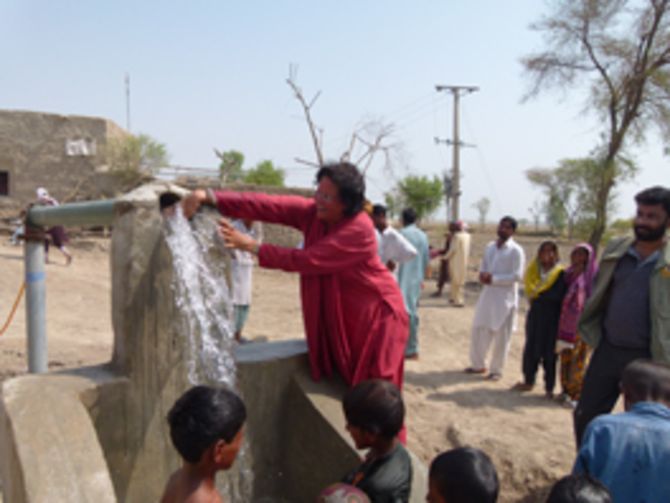“Our vision is a world in which not one single person suffers from leprosy, tuberculosis or other poverty-related diseases and their consequences, such as disability and exclusion.” For over 55 years people in the DAHW Deutsche Lepra- und Tuberkulosehilfe e.V. have been committing themselves to making this vision become reality And it is not “just” the treatment of diseases which matters.
In August last year I was in Pakistan with a small delegation. The journey took us via Karachi and Manhopir into Sindh, on to Islamabad, Rawalpindi, into Punjab and a variety of projects in Khyber Pakhtunkhwa. Our primary interest was rebuilding following the devastating flood in 2010. To this end we visited building projects in different parts of the country and held intensive talks with those responsible for the project.
The tremendous damage (approx. two million houses destroyed) had only been partially restored; there was still an enormous need for relief. But we had already achieved an incredible amount; besides almost 1,000 new buildings built and houses restored , we had also purchased livestock for families, organised clean water and sanitary facilities and given a little financial help to build up new livelihoods.
To do so optimally our DAHW joined forces with the MALC (Marie Adelaide Leprosy Centre), Caritas Austria and Caritas St. Pölten for strategic reasons in order to form a flood-relief consortium, pooling experience and support.
Maybe it was because I saw Pakistan through the eyes of a woman. The “everyday suffering” of the women there struck me immediately. Many women in Pakistan are still way out on the margins of society, without the freedom to do many things which are taken for granted in Germany, such as making one's own decisions (without any men) and the ability to move freely in public, at school or university. It is impossible for these women to lead a self-determined life. Especially in the poorer classes of the population women have hardly any rights. If they fall sick it is the family patriarchs who decide whether to allow them to be treated, or not. In this patriarchal country it is absolutely taboo for a woman to be examined by a man. They can only go to female doctors or nurses and there are still not enough of them in Pakistan.
Given that background the work of Dr. Ruth Pfau and the Marie Adelaide Leprosy Centre in Karachi and of Dr. Chris Schmotzer, the medical director of ALP (Aid to Leprosy Patients) in North Pakistan, is particularly important. Ruth Pfau is known as the “Leprosy doctor” and Chris Schmotzer is a highly respected tuberculosis expert. And both women are also gynaecologists, working tirelessly in their effort to provide Pakistani women with the medical care which is so vital, but so rare.
And occasionally these committed doctors succeed - beyond the medical aid - in influencing the course of the life of one of their patients, as in the case of young Samina. Samina came into the MALC suffering from severe tuberculosis. She was very weak and the situation was almost hopeless. She decided to fight it and spent six months in hospital away from the family and daily duties at home. After she had recovered completely she wanted to stay at the MALC to help other sick people. Samina is now training to become a leprosy technician. “That was my best-ever decision,” the 20-year-old happily recounts.
Pakistan and young Samina are just two examples of how positive an impact our support from Germany can have on the life of people all over the world.
Gudrun Baroness of Wiedersperg
Honorary President



